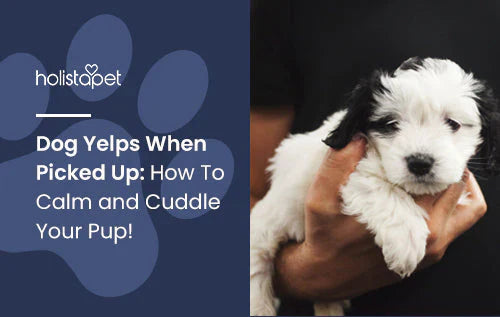A dog yelp can catch us by surprise, especially if we are just trying to show our pup love or hold them close. You may be wondering why your dog yelps when picked up, especially if you have never heard this reaction before. There are many reasons why a dog cries out when picked up, ranging from fear and surprise to pain and injury.
It's important to figure out exactly what is causing your dog to yelp when handled so you can provide them with proper treatment. If your dog has started yelping when picked up, here is what you can do as a dog owner to keep your dog comfortable and healthy when during handling.
Dog Yelps When Picked Up - Possible Reasons Why
Dogs are quite vocal, using a variety of sounds to communicate with us. One of those sounds is a yelp, which can often sound like your dog is in pain or afraid. That's why it can be concerning when your dog yelps when picked up. Here are the most common reasons a dog will let out a cry when handled:
- Excitement: That's right! It could be a positive reaction. Look for a wagging tail and their tongue coming out of their mouth. Your dog may be happy to get attention from you.
- Scared: Your dog may react with surprise if suddenly swooped off the floor. Some dogs don't like when you dangle them or hold them up high.
- Pain: Dogs are often good at hiding physical pain, but handling may trigger your pup. If they are experiencing joint or muscle problems, bruises, broken bones, soft tissue injuries, or another sickness, they may yelp.
- Discomfort: You may be simply holding your dog wrong, making them uncomfortable or agitated.
Was There a Traumatic Event?
Like us, dogs can become triggered in certain situations. It's possible your dog experienced something unpleasant or painful the last time someone touched or picked them up. It may also remind them of a previous situation, like a dog attacking them from behind or getting hurt by a rougher child. These experiences can leave your dog triggered when picked up by surprise.

Shelter dogs often struggle with worries that are trauma-based. If you've rescued your dog and have noticed that they seem excessively afraid or nervous, it may be a good idea to reach out to a vet or the shelter you rescued them from for professional medical advice.
Effects of Trauma
If you suspect that your dog has PTSD (or post-traumatic stress disorder), there are some symptoms to look for that go beyond yelping when picked up. Here are some trauma symptoms to look for if your dog yelps when picked up:
- Urinating or defecating inside the house
- Howling and barking
- Whining and whimpering
- Destructive behavior (i.e., chewing, biting, or digging)
- Excessive grooming
- Tucked tail
- Shaking
- Panting
- Overly attached to you and clingy
- Aggression
- Lethargic behavior
- Refusal to eat
- Appearing paranoid or nervous
Remember that tips and tricks are not a replacement for professional medical care. A trained and licensed vet can properly assess and diagnose your pet.
Physical Problems
Dogs don't want you to worry about them. You'll often see them wagging their tail even when they are experiencing pain and illness. If your pup seems fine until you touch certain areas on their body, yelps could be a sign of a hidden health problem. This can range from bruises and aches to more serious problems like fractures or other serious sicknesses.
Spotting Physical Problems
Worried your dog may be ill or injured? There are many signs to look for if your dog cries out or yelps when picked up. It could be more than just a surprise if you notice these other signs:
- Aggression: Your dog may start growling or lashing out when people come near them.
- Lethargy: If your dog no longer wants to play or cuddle, there could be big problems underneath their fur.
- Excessive Sleeping: Dogs in pain are often exhausted or trying to heal.
- Limping: This is a sign that your dog has joint pain, fractured bones, or even a spinal cord injury.
- Excessive Grooming: Your dog may start biting and chewing at a certain area if it's the source of your dog's pain.
- Whining When Touched: If your dog whines when groomed, brushed, or pet, they may be experiencing discomfort.
- Howling or Barking: Your dog may be more vocal when experiencing pain.
- Difficulty Eating: Like us, dogs may lose their appetite when in pain. They may also avoid eating if they have dental issues.
- Panting: Your dog may breathe heavily or start panting when in pain. Shallow breathing can mean it hurts for them to breathe.
- Shaking: Shaking and trembling can be signs of discomfort. Too much chocolate, for example, can cause muscle tremors.

When Is Dog Yelping Not a Serious Concern?
If your dog has always yelped when picked up, it could be a natural response for them. Some dogs truly don't enjoy it when people pick them up or handle them. Others are afraid of being lifted off the floor. If your dog has yelped when picked up since they were a puppy, try not to pick them up unless needed — it could be stressing your dog out or annoying them.
When Is a Dog Yelp a Reason To Go to the Vet?
A dog's yelp can be alarming, and it's essential to recognize when it signifies something more serious than a temporary discomfort. If your dog yelps when picked up or suddenly starts yelping without an apparent reason, it could indicate underlying health issues that require immediate attention.
Broken Bones
One of the most critical reasons to bring your dog to the vet immediately is the possibility of broken bones. If your dog yelps when you lift them or if they suddenly stop using one of their legs, it could be a sign of a fracture. Dogs may attempt to hide their pain, but if they exhibit signs like limping, swelling, or crying out when touched, a broken bone might be the culprit.
X-rays and a thorough examination by a vet are necessary to diagnose the issue properly and to start appropriate treatment. Leaving a broken bone untreated can lead to severe complications and long-term damage to your pup's mobility and comfort.
Joint or Muscle Problems
Joint or muscle problems, such as arthritis, pulled muscles, or ligament injuries, can also cause your dog to yelp in pain. Dogs suffering from joint pain may yelp when you touch certain areas, particularly around the rear or front legs. If your dog has been less active, seems stiff after sleeping or resting, or cries out when they move, these could be signs of joint or muscle discomfort. Conditions like arthritis are chronic and will worsen without proper management, so it's essential to get your dog to the vet for a diagnosis and treatment plan.
Nerve Disorders
Another possible cause of your dog’s sudden yelping could be nerve disorders. These can occur due to injuries to the spine or neck area and can cause acute pain when the dog is touched or picked up. If your dog yelps and exhibits symptoms such as unsteady walking, dragging of back legs, or loss of balance, these could be signs of nerve damage or a spinal issue. Immediate veterinary attention is crucial to prevent the condition from worsening and to alleviate your dog's pain.
Physical Injuries
Dogs are active animals, and sometimes their playful behavior can lead to physical injuries. If your dog suddenly started yelping after playing with another dog, jumping off furniture, or even after a seemingly innocent tumble, they may have sustained a physical injury. Physical injuries can range from bruises to more severe damage like ligament tears or internal injuries. Watch for signs such as reluctance to move, sensitivity to touch, or changes in behavior, as these could indicate that your dog is in pain and needs to see a vet ASAP.
Internal Issues and Illnesses
Sometimes, a dog’s yelp can be a sign of internal issues or illnesses that are not immediately visible. Conditions affecting the chest, abdomen, or internal organs can cause significant pain and discomfort. If your dog is yelping, especially when touched in specific areas like the chest or abdomen, and shows other symptoms such as vomiting, loss of appetite, or lethargy, it's crucial to seek veterinary attention immediately. Internal issues can be life-threatening and require prompt diagnosis and treatment.
Behavioral Responses to Stress or Fear
While not always linked to a physical injury, a dog yelp can also result from emotional distress, stress, or fear. If your dog yelps when picked up or when in certain situations, it might be a sign that they are feeling threatened or scared. This kind of yelping might be accompanied by other signs of stress, such as a tucked tail, trembling, or avoidance behavior.
Although this may not always require immediate medical attention, consulting a vet or a professional dog behaviorist can help determine if there's an underlying issue that needs to be addressed.
Ways to Help:
Does your dog yelp when picked up? Do they struggle while in your arms? Here are some ways to help a yelping pup deal with getting picked up.
Pick Them Up Properly
First, it's important to make sure you pick up your dog the correct way. Holding your dog incorrectly can scare them or hurt them. When it comes to puppies, try picking them up by placing one of your hands between their front legs. Another hand should support their rear legs and backside. This is similar to the way you'd pick up a small dog, which requires one hand on their chest and one on their rump. Hold your dog close to your chest, so they feel secure.

Is your dog a bit bigger? Bend at your knees, not your waist. Then wrap one of your arms across your dog's front, supporting their chest in front of the legs. Put your other arm around their back legs, supporting their rear end. Then, lift them with your legs, not your back. Medium and large breeds may need two people to pick them up properly and comfortably.
Don't Surprise Them
If you want to pick up your dog, make sure your dog knows that it's about to happen. Do not pick your dog up from behind without warning, especially if your dog has experienced trauma. You might even want to pet your dog or give them a treat beforehand, making the process a bit more positive and comforting.
Don't Pick Up an Injured Dog
If possible, don't pick up your dog if they are suffering from a known injury. Let your dog heal without a lot of unnecessary handling. Try giving them a comfortable place to rest in a room where no one can bother them. If you must pick up your injured dog, try picking them up from a spot like the couch or bed. This will make it easier to move them without as much jostling.
Use a Product Meant To Carry Dogs
There are products made specifically to carry around dogs. This may include baskets, pet carriers, crates, and even products that strap your small dog to your chest like a baby. Sometimes these products make the carrying process much more comfortable for your dog.
Provide Your Dog With CBD
CBD is a natural, non-intoxicating compound found in the hemp plant that will soothe and comfort your dog. CBD interacts with your dog's ECS, thus supporting their overall balance and well-being. This means it provides an abundance of positive benefits throughout your dog's body and mind.
Try administering CBD about 30 minutes before picking your dog up to help keep them calm and relaxed. They won't be as stressed and nervous if they don't enjoy being handled. CBD also reduces physical discomfort, keeping your dog comfortable when you need to pick them up.
Where To Get CBD Products for Dogs
You're in the right place! HolistaPet makes it easy to provide your dog with CBD in even the most problematic situations. We have a variety of CBD treats that come in your pup's favorite flavors. This means that your dog will excitedly eat them up even when experiencing discomfort.
HolistaPet also has CBD oil that you can add to your dog's food without detection or dropped into their mouth directly. You can also try our CBD bath products to help your dog if they are experiencing joint pain, neck pain, or have sensitive skin.
Final Thoughts - Dog Yelps When Picked Up
Dogs are usually tolerant of our weird behaviors. They let us dress them up, take goofy photos of them, and cuddle them. But sometimes, you might notice your dog behaving differently when picked up or handled. If your dog has started whimpering or yelping when picked up, your dog may be in pain or experiencing mental anguish.
If you suspect that your dog is in pain or suffering from a serious illness, keep an eye on their other behavior. They may have started limping or refusing to eat. Take your dog to the vet right away if you believe they are in pain or sick. In the meantime, use the proper holding technique and provide your dog with CBD treats to keep them calm and comfortable when you have to pick them up.







![Probiotics For Dogs [Soft Chews] - HolistaPet](http://www.holistapet.com/cdn/shop/files/Probiotic-Infographic-1_472d7a29-e30c-435a-9638-1365d8c3a9f9.jpg?v=1725384841&width=104)




























1 comment
Jeremiah G. Kelley
My lil 8week old tiger stripped pitbull yelps very loudly when I pick him up, he only does is sometimes tho, not every time. I have read deeply into this so I make sure I’m picking him up correctly, I have checked his whole budu to make sure he is not hurt nowhere, I make sure he knows I’m picking him up so it’s not that I’m starting him. He sleeps with me every night for the 2weeks I have had him. He just started doing this like 3/4 days ago, it wasn’t like this at first. I can not figure out why he is doing this and it’s kind of scary. Please if you know anything contact me at 7655531992. You can txt me any time. Please and thank you so very much.
Leave a comment
All comments are moderated before being published.
This site is protected by hCaptcha and the hCaptcha Privacy Policy and Terms of Service apply.